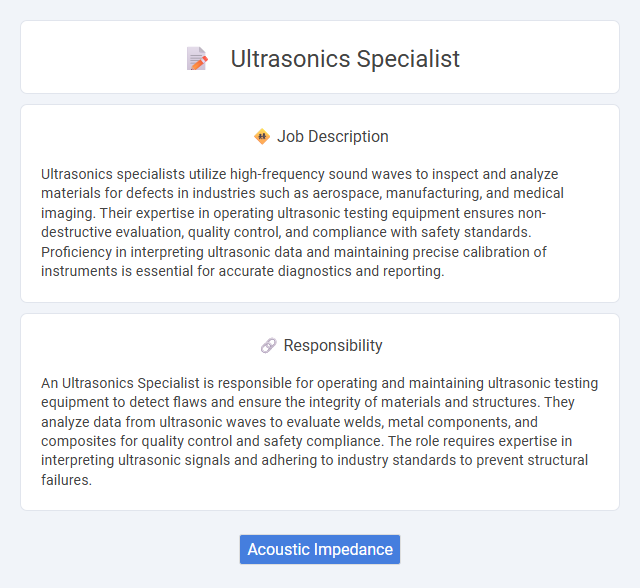
Ultrasonics specialists utilize high-frequency sound waves to inspect and analyze materials for defects in industries such as aerospace, manufacturing, and medical imaging. Their expertise in operating ultrasonic testing equipment ensures non-destructive evaluation, quality control, and compliance with safety standards. Proficiency in interpreting ultrasonic data and maintaining precise calibration of instruments is essential for accurate diagnostics and reporting.
Individuals with strong technical skills and attention to detail are likely suitable for a career as an ultrasonics specialist, as the role demands precision in operating and interpreting ultrasonic equipment. Those prone to high stress or with significant physical limitations might find the job challenging due to the need for sustained focus and occasional physical activity. A propensity for problem-solving and continuous learning increases the probability of success in this specialized field.
Qualification
Ultrasonics specialists typically require a bachelor's degree in electrical engineering, mechanical engineering, or a related technical field, with advanced knowledge in acoustic wave theory and signal processing. Proficiency in using ultrasonic testing equipment and software, coupled with hands-on experience in non-destructive testing (NDT) methods, is essential for accurately detecting material flaws and ensuring quality control. Certifications such as ASNT Level II or III in ultrasonic testing significantly enhance job qualifications and career advancement opportunities.
Responsibility
An Ultrasonics Specialist is responsible for operating and maintaining ultrasonic testing equipment to detect flaws and ensure the integrity of materials and structures. They analyze data from ultrasonic waves to evaluate welds, metal components, and composites for quality control and safety compliance. The role requires expertise in interpreting ultrasonic signals and adhering to industry standards to prevent structural failures.
Benefit
Ultrasonics specialists likely enjoy benefits such as access to cutting-edge technology that enhances diagnostic accuracy and treatment efficiency. There may be opportunities for professional growth due to the high demand for expertise in various industries, including medical imaging and industrial testing. Compensation is probably competitive, reflecting the specialized skills and critical role ultrasonics specialists play in improving equipment performance and patient outcomes.
Challenge
Facing complex equipment and evolving technologies, the Ultrasonics specialist likely encounters frequent challenges in troubleshooting and optimizing ultrasonic systems. They probably need to adapt rapidly to advancements in materials and signal processing techniques to ensure precise measurements and diagnostics. Balancing accuracy with efficiency may often test their problem-solving skills and technical expertise.
Career Advancement
Ultrasonics specialists with expertise in advanced diagnostic imaging and non-destructive testing techniques experience significant career advancement opportunities across medical, industrial, and engineering sectors. Mastery in ultrasonics technology, combined with certifications such as RDMS (Registered Diagnostic Medical Sonographer) or PCN (Personnel Certification in Non-Destructive Testing), enhances prospects for leadership roles and specialized research positions. Continuous professional development in areas like Doppler ultrasound, phased-array ultrasonics, and AI-driven imaging protocols drives upward mobility and higher earning potential.
Key Terms
Acoustic Impedance
Ultrasonics specialists analyze and manipulate acoustic impedance to optimize sound wave transmission in various materials and devices, enhancing imaging and measurement accuracy. Mastery of acoustic impedance principles allows these professionals to improve ultrasonic sensor performance in industries such as medical diagnostics, non-destructive testing, and underwater sonar. Their expertise in impedance matching ensures maximum energy transfer and minimal signal loss, critical for precise ultrasonic applications.
 kuljobs.com
kuljobs.com